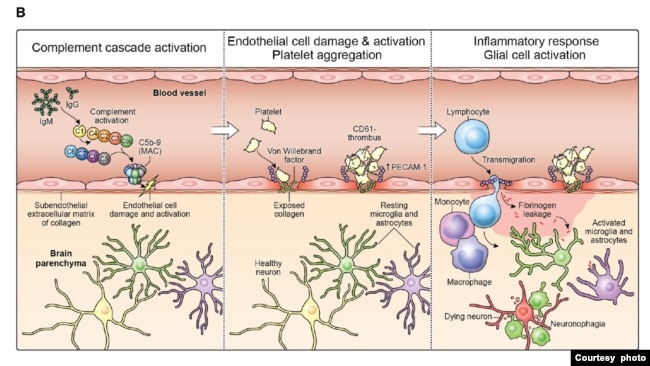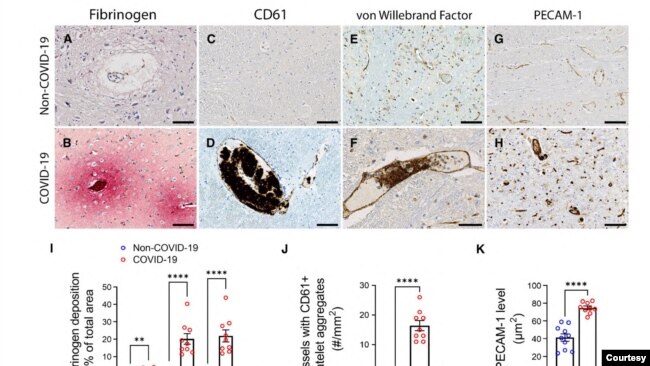驚きの研究結果です!!
後遺症に苦しむ人々の光となることを期待します!!
現在進行形の感染症ですから、この程度の医学用語はマスターして
さぁ、いざ攻略!!
autopsy:【ɔ́tɑ̀psi】検死
endothelial cells: 【èndouθíːliəl】内皮細胞
blood-brain barrier :血液脳関門
VOAで英語を学びましょう!!
研究成果: コロナが引き起こす免疫反応が脳にダメージを与える可能性を示唆(和訳)
Study: Immune Response Caused by COVID May Damage Brain
July 12,2022
米国国立衛生研究所の小規模な研究によると、COVID-19感染による免疫反応が脳の血管を損傷する可能性があるという言います。この反応はlong COVID新型コロナウイルス感染症の後遺症として知られる神経学的な問題を引き起こす可能性があります。
この研究では、研究者はCOVID-19の原因ウイルスであるSARS-CoV-2に感染して急死した9人の脳の変化を調査しました。その結果は先週、Brain誌に掲載されました。
脳の血管へのダメージ
研究者らは、抗体 —ウイルスと戦うために免疫系が作り出すタンパク質 —が、脳血管系細胞への攻撃に関与していることを明らかにしました。これが、炎症と損傷を引き起こします。
この結果は、2020年に行われた先行研究と同様でした。
どちらの研究でも、SARS-CoV-2は患者の脳には見つかりませんでした。これは、ウイルスが脳を直接攻撃していなかったことを示唆しています。
NIHの科学者アビンドラ・ナス氏は、この研究の上級研究員です。彼は、「以前、autopsy検死で患者の脳に血管の損傷とnflammation炎症が見らましたが、その原因は分からなかったのです。」 と述べています。An autopsy とは、死因を調べるために死体を調べることです。
今回の研究では、ナス博士と研究チームは、24歳から73歳までの9人の脳組織を調査しました。この脳組織は、スキャン画像に脳血管の損傷の兆候が見られたため、選ばれました。そして、そのスキャン画像を対照群である10人の画像と比較しました。
研究者らは、COVID-19と闘うために作られた抗体が、誤って脳血管内皮細胞を標的にしている可能性があることを突き止めました。これらの細胞はendothelial cells内皮細胞と呼ばれ、有害物質が脳に到達しないようにするバリアの役目を果たしています。この細胞の損傷は、COVID-19患者の一部で出血や閉塞を引き起こし、stroke脳卒中のリスクを増大させます。
先の研究と同様、研究者らは血管の漏れの兆候を発見しました。これは、blood-brain barrier 血液脳関門の中の内皮細胞間の連結が損傷していることを示唆しています。
ナス博士は、一度漏出が起こると、免疫細胞が”損傷を修復しに来て、脳内に炎症を引き起こすかもしれない”と述べています。
長期的な神経症状
研究者らは、内皮細胞が損傷した部位で、遺伝子発現の変化も発見しました。300以上の遺伝子の発現が減少し、6つの遺伝子の発現が増加しました。これらの遺伝子は、体内の化学物質の不均衡に対処する脳の機能に関連しています。
これらの知見を総合すると、COVID-19に関連する神経障害の原因に関する情報が得られるかもしれません。また、この知見は、血液脳関門の内皮細胞間の損傷連結を標的とする新しい治療法を見つけるために利用されるかもしれません。
この研究は、COVID-19後の長期的な神経症状の理解と治療にも役立つ可能性があります。その症状とは、頭痛、疲労感、味覚・嗅覚の喪失、睡眠障害、"ブレインフォグ "と呼ばれる物忘れなどです。
もし、この研究の9人の患者が生存していたら、コロナ感染症による後遺症を発症していた可能性が高いと研究者は考えています。
「このような免疫反応がコロナ感染症による後遺症患者にも持続している可能性は十分にあります。」とナス博士は言います。この研究結果は、コロナ感染症による後遺症の治療法を探している研究者にとって”非常に重要”であると、博士は付け加えています。
Study: Immune Response Caused by COVID May Damage Brain
A small study from the U.S. National Institutes of Health says the immune response caused by COVID-19 infection may damage the brain’s blood vessels. The reaction could lead to neurological problems known as long COVID.
In the study, researchers examined brain changes in nine people who died suddenly after being infected with SARS-CoV-2, the virus that causes COVID-19. The results appeared last week in the publication Brain.
Damage to the brain’s blood vessels
The researchers found that antibodies — proteins produced by the immune system to fight viruses — are involved in an attack on the cells lining the brain’s blood vessels. This causes inflammation and damage.
The results were similar to an earlier study done in 2020.
In both studies, SARS-CoV-2 was not found in the patients’ brains. This suggests the virus was not attacking the brain directly.
NIH scientist Avindra Nath is the senior researcher of the study. He said, “We had previously shown blood vessel damage and inflammation in patients’ brains at autopsy, but we didn’t understand the cause of the damage.” An autopsy is the examination of a dead body to find out the cause of death.
For the study, Dr. Nath and a team of researchers examined brain tissue from nine individuals between the ages of 24 and 73. The individuals were chosen because their scans showed signs of blood vessel damage in the brain. The scans were then compared to those from 10 individuals in a control group.
The researchers found that antibodies produced to fight COVID-19 may mistakenly target cells that line the brain’s blood vessels. These cells, called endothelial cells, serve as barriers to keep harmful substances from reaching the brain. Damage to the cells causes bleeding and blockage in some COVID-19 patients and increases the risk of stroke.
As in their earlier study, researchers found signs of leaky blood vessels. This suggests that the links between endothelial cells in the blood-brain barrier were damaged.
Dr. Nath said that once the leaks happened, immune cells “may come to repair the damage, setting up inflammation” in the brain.
Long-term neurological symptoms
Researchers also found changes in gene expression in areas with damage to the endothelial cells. More than 300 genes showed decreased expression, while six genes showed increased expression. The affected genes are connected to the brain’s ability to deal with chemical imbalances in the body.
Together, these findings may provide information about the cause of neurological problems related to COVID-19. The findings may also be used to find new treatments to target the damaged links between the endothelial cells in the blood-brain barrier.
The study may also help with understanding and treating long-term neurological conditions after COVID-19. The conditions include headache, tiredness, loss of taste and smell, sleep problems, and forgetfulness known as “brain fog.”
If the nine patients in the study had survived, the researchers believe they would have likely developed long COVID.
“It is quite possible that this same immune response persists in long COVID patients,” Dr. Nath said. The findings, he added, are “very important” to researchers seeking to find treatments for long COVID.
Words in This Story
response - n. something that is done as a reaction to something
neurological - adj. related to the study of the nervous system and the diseases that affect it
vessel - n. a vein or artery that carries blood through the body
inflammation - n. a condition in which part of the body becomes swollen and painful
stroke - n. a serious illness caused when a blood vessel in the brain is broken or blocked
persist - v. to continue to exist beyond the expected time

